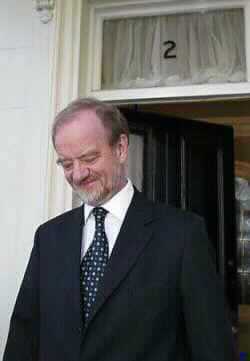British Prime Minister Tony Blair suffered his biggest political blow of the Iraq crisis on Monday when a senior cabinet minister resigned in protest at the prospect of war and another said she may follow. "As I cannot give my support to military action...I write with regret to resign," Robin Cook said in a letter to Blair. "In principle I believe it is wrong to embark on military action without broad international support."
His resignation came as the United States issued an ultimatum to Iraqi President Saddam Hussein to leave the country or face war after diplomatic efforts to win United Nations backing for military action collapsed.
The diplomatic impasse confirmed Blair's worst nightmare.
His pro-U.S. Iraq policy has set the centrist Labour leader against a large part of his party in the biggest crisis of his premiership since taking power in 1997. The wider public is also largely opposed to a war without U.N. backing.
The embattled prime minister faces a vote on a Gulf war in parliament on Tuesday and the prospect of a massive rebellion by his own party. Cook's resignation, the first time a cabinet member has quit in protest over policy since Blair took power, could also lead other disgruntled ministers to walk.
Last month, 122 Labour members of parliament, more than one in four, defied Blair's hawkish Iraq stance. Rebels in Blair's ruling party say that number could rise by another 40 this time.
The support of opposition Conservatives will deliver Blair parliamentary support almost whatever the size of the Labour rebellion. But opposition in his party could be lethal for Blair's leadership if there are many casualties of war.
Weighed down by Blair's political problems, the pound had fallen by late afternoon to a three-month low against the dollar.
MORE RESIGNATIONS?
International Development Secretary Clare Short said she might also quit government. Her officials said she was reflecting on her position overnight.
Last week, she said she would resign in the event of an onslaught without U.N. authority, calling Blair reckless.
Cook's decision came as the United States and Britain made the final preparations for an imminent war.
PHOTO CAPTION
Britain's Leader of the House of Commons, Robin Cook, leaves his residence in London on March 17, 2003. Downing Street said Cook had resigned after Britain admitted it had ended diplomatic efforts to win U.N. (Paul Mcerlane/Reuters
- Author:
& News Agencies - Section:
WORLD HEADLINES


 Home
Home Discover Islam
Discover Islam Quran Recitations
Quran Recitations Lectures
Lectures
 Fatwa
Fatwa Articles
Articles Fiqh
Fiqh E-Books
E-Books Boys & Girls
Boys & Girls  Women
Women










